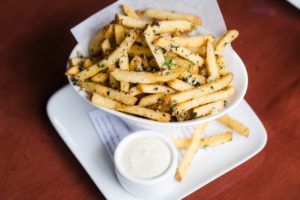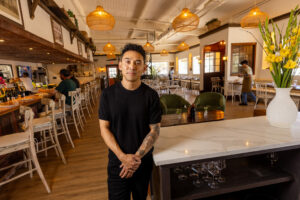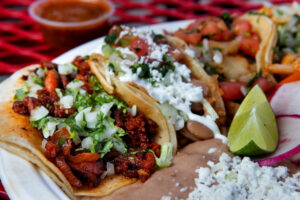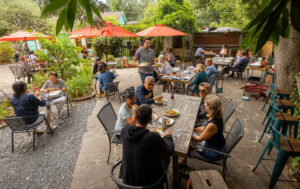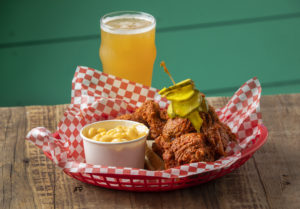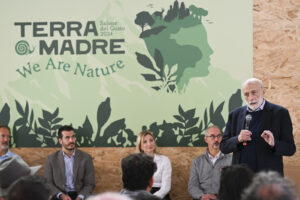Jennifer Harris always seems to show up with a bottle or jar of something, well, curious inside. Sometimes fizzing, maybe a little slimy or with an earthy funk, but inevitably delicious.
A self-described fermentation addict, Harris is pied piper of one of the most ancient forms of preservation known to mankind. Smart as a whip, the bubbly blonde can break down the science behind of lacto-fermentation and explain the difference between various probiotic bacteria quicker than you can say pickle. She’s also the organizer of the first Farm to Fermentation Festival, which will be held on Sept. 16 at Tara Firma Farms in Petaluma.
So why all the hubub about SCOBYs and kefirs? Harris and others advocate the health benefits of probiotics found in many fermented foods. Science and food manufacturers seem to be catching up, offering more and more probiotic choices on grocery shelves. But at-home fermentation is one of the oldest, most traditional ways of preserving food — it’s just that many of us have forgotten how.
Between brinings, she answered a few questions about how she got started in the fermentation game
 Q. How did you start fermenting?
Q. How did you start fermenting?
A. During my freshman year of college, I met someone who was brewing kombucha in her dorm room. Her roommates began to complain about the smell, and I didn’t live in the dorms and so she asked if she could keep it at my house. I agreed, and she told me that she would stop by once a week to “tend” to it. Over the next few months, it became clear that she didn’t really have any idea what this thing was, or what to do with it. I began doing research on the stuff, and learned how to bottle it in order to achieve a carbonated product. In the next few years, it became popular on the store shelves. I got to the point where I was bottling 120 bottles every week to barter or give away, and I realized that I should start looking into other fermentations. Along the first few batches of pickles and sauerkraut, I started to notice my metabolism changing as I incorporated more fermented foods into my diet. One of the biggest changes that I noticed in the first two years was the decrease in common colds that I would get.
Q: What’s the weirdest thing you’ve ever fermented?
A: Along the kombucha learning path, I discovered Wild Fermentation by Sandor Elix Katz. This book is filled with recipes for many cultural ferments – things I had never heard of. It encouraged to try things that weren’t in the book. I was inspired by Katz’ renegade attitude towards bacteria – and – as someone who always enjoys a moment of rebelling, I was excited to start playing with my food in ways that I hadn’t been formally taught. One of my favorite things to do is to inoculate new mediums with the kombucha SCOBY or vinegar “mother”. By introducing new bacteria (other than green tea leaves and their native bacteria) to a symbiotic colony of bacteria and yeast, you see the true life of the fermentation as it changes its ecosystem. A simple way to think about this is taking a vinegar mother from a white wine vinegar vessel and introducing it to blackberry wine, beer, or mead. It changes the living ecosystem into a rather different one than the white wine, but still allows the fermentation to make an enzymatic change to the medium. Banana vinegar? Russian Stout kombucha? I am most excited to start experimenting with the nukazuke pickle process next. This is a traditional Japanese process of fermentation involving inoculated rice bran as the medium for fermentation. I am waiting to start my Nuka pot until the week that the festival is over!
Q: How do you explain fermentation to people?
A: To me, Fermentation is a natural process that is happening all around us. Like most of the wonderful things in this world, it preceded humankind. It is essentially the breakdown of molecules through enzymatic conversion. It’s a way to incorporate living foods into your body’s ecosystem, which diversifies our internal flora and aids us when we run into a pathogen or toxin. It’s also a way to play Creator, and control an environment full of living creatures.
Q: Who is your fermentation idol?A: My fermentation idol is actually someone that I’ve never met in person. Her name is Jane Campbell and she lives in St. Louis, MO. We have found each other through the internet, via Sandor Katz and web forums dedicated to home fermentation. She and I mentor each other with new ferments. She ferments mostly for experimentation and has a deep love of scientific process. I find that many people are more into either lactic acid fermentation (think kraut and pickles) or they are into alcoholic fermentation. Jane is equally interested in both, as I am, and it makes for lots of fun conversation.
Q: You often show off a massive Kombucha mother you call the SCOBY Hotel. What is it?
A: The SCOBY Hotel was an accidental discovery. I can’t admit to coining the phrase. I was reading Kombucha Kamp’s website one day and found that the author referred to one of her vessels as the “SCOBY Hotel.” I looked over at one of my kombucha vessels that was housing about 10 SCOBYs and I thought, “Oh, that’s what that is. A hotel.” In actuality, this is a great way to store the “veil” or “mother” in its favorite medium, so that if you want to experiment with other mediums, you’ll have some back up SCOBYs to throw at a crock of something new. It’s also a great way to store them until you meet someone who says, “I have always wanted to make that stuff! I need to find someone who will give me some of their mother.”
Q: How did you come up with the idea for the Farm to Fermentation Festival?
A: After coordinating the Freestone Fermentation Festival, I had a hunch that Sonoma County wanted something more. I wanted to offer an event for those who truly wanted to learn these processes to do at home. There are so many food festivals in California that allow you to show up, nibble all day, and go home stuffed. The only problem is, you have to wait until the next food festival to get that great food again! With Farm to Fermentation, you will learn that you can take farm fresh products and turn them into nutrient dense foods in your home. This event offers you the opportunity to sample the products made in small-batch fermentation, as well as attend a demonstration class on how to make salumi, sauerkraut, pickles, yogurts and more at home. The event also features a Fermenters Market, where high quality (and small-batch!) fermented foods are showcased for attendees to sample and learn about.
Q: What’s the best way to get involved in fermentation?
A: There are many ways to get involved! Finding out what you like best and starting with that is my best advice. Did you used to love your Grandmother’s pickles? Does hot-from-the-oven sourdough bread make you weak in the knees? Do your find yourself drooling at the local cheese counter? Find a fermented food that YOU are interested in making, and figure out how to make it. The process of fermentation is different for each fermented food/beverage, but similar in the way that you learn to help control the environment in order to proliferate the correct bacteria. With the first few batches of pickles and sauerkraut, I started to notice my metabolism changing as I incorporated more fermented foods into my diet. One of the biggest changes that I noticed in the first two years was the decrease in common colds that I would get.
Farm to Fermentation Festival: Tickets, $35 per person, Sept. 16, 2012, 11 a.m. to 5 p.m., Tara Firma Farms, Petaluma. Buy tickets at http://www.farmtofermentation.com/tickets/


